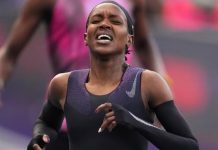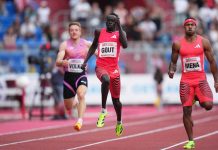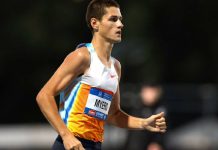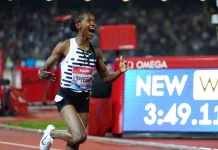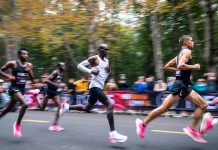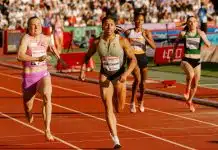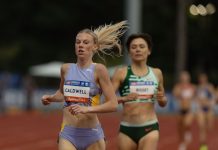MATT FITZGERALD – Runner’s Tribe
Matt Fitzgerald is an acclaimed endurance sports coach, nutritionist, and author. His many books include The Endurance Diet, 80/20 Running, and How Bad Do You Want It?
Every endurance athlete knows that it takes more than training to achieve peak fitness. Diet has an important role to play as well. But what exactly is that role? In other words, what specifically is an endurance athlete’s diet supposed to do for him or her? I believe it must do three main things, which can be ranked in order of priority. Here they are:

1. Supply enough total energy every day.
We live in a society where overeating is a widespread problem. Because of this, most endurance athletes don’t think about the risk and costs of eating too little. The fact of the matter is that if you can only get one thing right about your diet as an endurance athlete, that thing should be eating enough to fully meet your body’s energy needs. From a performance perspective, it is better to eat too much and/or to eat crappy food than it is to eat too little (not that I recommend eating too much or eating crappy food!).
In 2018, the British Medical Journal published the results of an assessment of the adequacy of energy intake among competitive male road cyclists. Fourteen of these 50 athletes were found to have low energy availability, meaning they consumed fewer calories than their bodies used, and 10 were classified as chronic cases. These 10 athletes had lower testosterone levels, lower bone mineral density, and lower functional threshold power outputs than the other 40 cyclists.
It is an undeniable fact that having a lean body composition contributes positively to endurance performance, and that overeating is contrary to the goal of achieving a lean body composition, but too many athletes eat too little in the effort to achieve a lean body composition and pay a bigger price than they would if they over-ate.
Check out this recent article on Danish pro cyclist Jakob Fuglsang, in which he credits an increase in food intake—and in carbohydrate intake in particular—for enabling him to rebound from a lackluster 2018 racing season caused by underfueling. It’s pretty instructive.
2. Maintain consistently high overall quality.
The average endurance athlete doesn’t even know what diet quality is, let alone how important it is. Simply put, the concept of diet quality refers to the amounts and diversity of high-quality food types in the diet, where the quality of a food type is determined by epidemiological research on its actual health effects. The highest-quality diets include lots of the highest-quality food types (e.g., vegetables), and they do not exclude any of the high-quality food types (e.g., fish, dairy), and they contain only small amounts of low-quality food types such as refined grains and processed meats.
I’ve traveled all over the world to sit down and eat with the world’s greatest endurance athletes, and the most salient commonality I’ve observed is the high quality of their diets. That’s no accident. A high-quality diet maximizes total nutrition per calorie, optimally supporting metabolism, recovery, tissue remodeling, immune function, antioxidant defenses, and other processes vital to effective training while also promoting a lean body composition. While a high-quality diet has been very challenging for the athletes, this superfood – Athletic Greens supplement, could provide the needed benefits: boosting energy levels, supporting recovery from exercise, improving the immune system, and digestion.
The endurance community has been so weirdly fixated on macronutrients (which don’t matter nearly as much) for so long that research has been slow to demonstrate that the elites actually know what they are doing in focusing on diet quality instead, but it’s starting to change. This 2019 study, for example, found that runners who increased their diet quality as measured by one of the more commonly used indices experienced an increase in VO2max and a decrease in body fat, while controls did not.

3. Supply the right amounts of energy at the right times.
After total energy supply and overall quality, the next most important feature of an endurance athlete’s diet is sensible timing of energy intake. As a general rule, you want to take in more calories before, during, and after periods of activity and in other times of high energy demand (namely when you wake up in the morning, as your body has been drawing on stored energy all night) and fewer calories when you’re inactive.
Even if you get enough total calories most days, research shows that falling behind on meeting your energy needs during the day is costly. This 2018 study by scientists at the University of Agder and the University of Copenhagen found that endurance athletes who had energy deficits within the day had lower resting metabolic rates, lower testosterone levels, and higher cortisol levels than athletes who did not have energy deficits, even if they’d met their total energy needs by the end of the day.
On the flipside, eating when you don’t need to results in unfavorable nutrient partitioning, meaning more of the calories you consume will be stored as fat and fewer will be used to build lean tissue and meet immediate energy needs. So be sure to make a general habit of eating when you need to and not eating when you don’t.
It’s pretty simple stuff, really. Make it your first dietary priority to eat enough, your second to maintain consistently high diet quality, and your third to eat the right amounts at the right times, and you’re doing pretty much everything you can do eating-wise to enhance your endurance fitness and performance.
About the the author – MATT FITZGERALD
Matt Fitzgerald is an acclaimed endurance sports coach, nutritionist, and author. His many books include The Endurance Diet, 80/20 Running, and How Bad Do You Want It? Matt’s writing also appears regularly in magazines and on websites such as Women’s Running and competitor.com. His online training plans have helped thousands of athletes of all experience and ability levels achieve their goals. Certified by the International Society of Sports Nutrition, Matt has consulted for numerous sports nutrition companies and he is the creator of the Diet Quality Score (DQS) smartphone app. A lifelong athlete, he speaks frequently at events throughout the United States and internationally. Matt can be reached at matt@8020endurance.com.
Want a readymade or custom training program from one of the top coaches in the world. Follow this link: http://8020endurance.com/8020-run-plans/
80/20 training plans are provided via TrainingPeaks.com or FinalSurge.com. Both platforms offer comprehensive scheduling, logging, and analysis with outstanding web and mobile applications for all 80/20 plans. Our structured workouts plans, below, represent the latest training technology that makes completing a workout easier than ever. Structured workout run plans measure your intensity by either Pace,
Heart Rate, or
Power.







